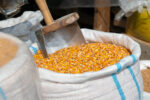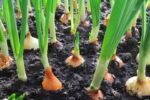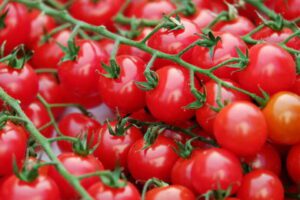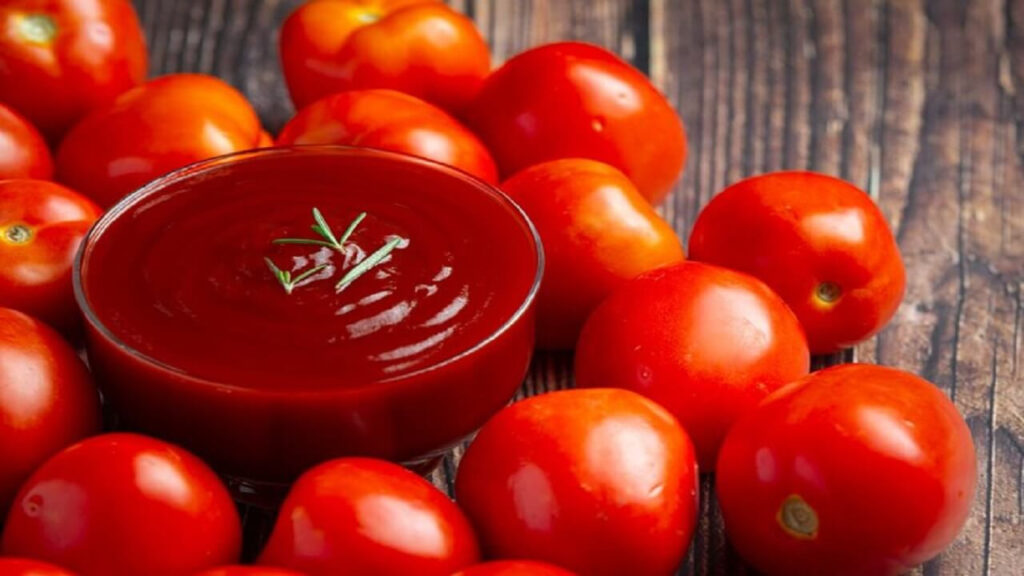Last updated on August 1, 2025
Choosing the right tomato variety is pivotal for profitable tomato farming in Nigeria. While there isn’t a single “best tomato variety in Nigeria” that fits all scenarios, this comprehensive guide explores essential selection factors and recommends top varieties tailored to your farm’s unique needs, helping you maximize yields and overcome common cultivation challenges. If you’ve ever asked your phone, “Okay Google, which tomato variety is best for me to plant in Nigeria?” this guide has your answer. We aim to equip you with the knowledge to make strategic decisions that future-proof your farm.
Quick Guide: Which Tomato Variety is Best In Nigeria? Key Considerations
- What is the most critical factor for choosing a tomato variety in Nigeria? Disease Resistance. Prioritize varieties resistant to common Nigerian diseases like Bacterial Wilt, Tomato Yellow Leaf Curl Virus (TYLCV), and Fusarium Wilt.
- How does climate affect tomato variety choice in Nigeria? Climate Adaptability. Select types suitable for Nigeria’s heat (dry season) or humidity (rainy season).
- How can I maximize profit from my tomato farm? Yield Potential. Opt for high-yielding hybrid varieties.
- What do Nigerian consumers look for in tomatoes? Market Appeal & Shelf Life. Choose varieties preferred for color, firmness, size, and extended shelf life to reduce losses.
- Where should I buy tomato seeds in Nigeria? Reputable Sourcing. Always buy certified seeds from trusted suppliers for quality and authenticity.
Finding the Best Tomato Variety for Your Nigerian Farm
Selecting the perfect tomato variety is the cornerstone of a successful agricultural venture in Nigeria. Given the nation’s high demand for fresh tomatoes and the challenges posed by its diverse climate – including intense dry seasons and often-humid rainy periods – this choice is particularly crucial. Understanding Nigeria’s unique agricultural landscape and its dynamic tomato market needs is vital for success.





Why Selecting the Ideal Tomato Variety is Crucial for Nigerian Farmers
The right tomato variety significantly impacts a farm’s high-yield potential. For example, some varieties can produce 20-30 tonnes per acre, while others yield significantly less. A well-chosen variety also inherently reduces common tomato farming challenges, leading to fewer pest outbreaks and less need for intensive disease management. To learn more about overall success, see our guide on how to become a successful tomato farmer.
- Success Story: Consider Farmer Ade, whose tomato crops in humid Ogun State were consistently ravaged by Bacterial Wilt. After switching to a specifically resistant hybrid variety, he saw his yields more than double in a single season, transforming his farm’s profitability. This highlights how a strategic variety choice can directly lead to agricultural success.
Understanding Nigeria’s Diverse Climate and Market Demands
Nigeria’s climate varies significantly, from humid southern rainforests to drier northern savannahs. A variety thriving in Lagos might struggle in Kano. Consequently, an effective tomato variety for Nigerian climate must be adaptable. Additionally, the tomato market is complex; some buyers prefer large, firm fruits for fresh consumption, while processors seek plum tomatoes for paste and sauces. Farmers should consider their target market before planting.
Key Considerations for Picking the Best Tomato Varieties in Nigeria
Before selecting specific varieties, understanding the factors that make certain types stand out is essential for safeguarding your investment and ensuring success.
1. Which Tomato Varieties are Resistant to Common Nigerian Diseases?
Diseases can quickly devastate tomato crops in Nigeria. Choosing disease-resistant tomato varieties serves as the first line of defense for consistent tomato production.



How to Combat Bacterial Wilt
Bacterial wilt is a notorious killer, especially in humid southern regions, causing plants to wilt despite adequate water. Selecting varieties with strong bacterial wilt resistance is non-negotiable. According to leading seed supplier Veggie Concept, Padma F1 is often cited for excellent tolerance in these challenging conditions.
- Actionable Tip: In addition to resistant varieties, practice crop rotation regularly to break the disease cycle in the soil. Avoid planting tomatoes or other susceptible crops (like peppers, eggplants) in the same spot year after year.
Battling Tomato Yellow Leaf Curl Virus (TYLCV) and Fusarium Wilt
Tomato Yellow Leaf Curl Virus (TYLCV), spread by whiteflies, and Fusarium wilt, a fungal disease, are widespread across Nigeria. Selecting varieties bred to resist these specific pathogens is paramount. Insights from agro-dealer Afrimash highlight Platinum F1‘s strong resistance to TYLCV.
Understanding Disease Codes for Informed Choices
Cryptic letters on tomato seed packaging indicate a variety’s disease resistance. Understanding these codes provides immediate insight into a variety’s built-in defenses.
Always look for these codes on your seed packets!




| Code | Disease Resistance |
| Va | Verticillium wilt |
| Fol | Fusarium wilt resistance |
| N | Nematode resistance |
| TYLCV | Tomato Yellow Leaf Curl Virus (TYLCV) |
| ToMV | Tomato Mosaic Virus (ToMV) |
| TSWV | Tomato Spotted Wilt Virus (TSWV) |
2. Which Tomato Varieties Withstand Nigeria’s Climate?
Nigeria’s diverse climate, from scorching dry season heat to heavy rainy season humidity, demands resilient tomato varieties.
Heat-Tolerant Varieties for Nigeria’s Hot, Dry Seasons
During intense heat, many tomato flowers drop without setting fruit (heat stress). “Heat-set” or heat-tolerant tomato Nigeria varieties are bred to produce fruit even in high temperatures. They are ideal for maximizing yields during dry spells. Examples include ‘Florida 91’, ‘Heatwave II’, and ‘Solar Fire’. According to the National Agricultural Extension and Research Liaison Services (NAERLS), these are well-suited for heat-tolerant tomato production under irrigation. [Source: NAERLS, “Heat-Tolerant Tomato Production Under Irrigation”].
Varieties That Perform Well in Rainy and Humid Conditions
High humidity in the rainy season often leads to fungal diseases and fruit cracking. Certain tomato varieties, particularly those thriving in tropical lowland settings, possess excellent fruit cracking tolerance, leading to less wasted produce. Agro-dealer Afrimash reports that Platinum F1 performs exceptionally well in humid conditions.
Adapting to Regional Climates: North, South, Middle Belt, East, and West
A variety thriving in Kano might struggle in Lagos. Northern Nigeria often has drier, more predictable conditions, while Southern Nigeria faces higher humidity and increased disease pressure. Versatile varieties adapt across these zones. Leading seed supplier Veggie Concept states that Padma F1 is known to perform well across all regions.




Boosting Your Bottom Line: Which Tomato Varieties Are Highly Productive in Nigeria?
High-yield tomato Nigeria varieties directly translate to higher profits for farmers.
Understanding High-Yielding Hybrid Tomato Seeds
Hybrid seeds are bred to combine the best traits from two parent plants, resulting in vigorous growth and significantly higher fruit production. While more expensive upfront, investing in hybrid tomato seeds Nigeria often leads to substantial returns in output. Platinum F1 and Padma F1 are prime examples of high-yielding hybrids. For more on maximizing output, explore our top 7 ways to grow tomatoes faster.
Determinate vs. Indeterminate: Picking the Right Growth Habit for Your Farm
- Determinate tomato varieties grow to a certain height, produce fruit all at once, and then stop. They are suitable for concentrated harvests, ideal for processing or quick market turnaround.
- Indeterminate tomato varieties continue growing and producing fruit over a longer period. They are perfect for continuous fresh market supply.
If you plan to process your harvest quickly, determinate varieties like Padma F1 are often your best bet for a concentrated yield.
Your choice depends on your specific market strategy and cultivation goals. To understand which varieties offer the highest returns, consider our guide on what is the most profitable tomato to grow.





3. Market Appeal & Shelf Life: Ensuring Profitability from Your Tomatoes
Selling tomatoes requires consideration of their appearance and longevity in the bustling Nigerian market.
What Nigerian Consumers and Processors Look For (Color, Firmness, Size)
Nigerian consumers prefer a deep, “blood-red” color, firm fruits that withstand transportation, and often larger sizes for better prices. For processing, plum tomatoes with low water content are highly sought after for thicker pastes and sauces. Farmsquare notes that Roma VF is a common favorite for processing. [Source: Farmsquare, “Roma VF Tomato Seeds (Open-Pollinated Variety)”, https://farmsquare.ng/shop/roma-vf-tomato-seeds/]. For more detailed care information on this variety, check out our Roma tomatoes plant care guide.
Tomato Varieties with Extended Shelf Life for Reduced Post-Harvest Losses
Post-harvest losses can significantly reduce potential earnings. Choosing tomato varieties with extended shelf life drastically minimizes these losses, as they remain firm and fresh longer during transport and storage, ensuring more consistent supply and less waste.
Which is the Best Tomato Variety for Your Farm in Nigeria? A Decision Guide
To determine which tomato variety is best in Nigeria for your specific context, ask yourself these questions:





- What is my primary growing season? (Dry Season = Heat-tolerant; Rainy Season = Humidity/Cracking resistant)
- What are the prevalent diseases in my region? (e.g., South = Bacterial Wilt, North = TYLCV)
- Am I targeting fresh consumption or processing? (Fresh = Firm, attractive; Processing = Plum, thick-walled)
- Do I prefer a concentrated harvest or continuous yield? (Determinate vs. Indeterminate)
By answering these, you can narrow down your options to the truly ‘best’ fit for your farm. Below are top recommended varieties based on these considerations.

Top Recommended Tomato Varieties: Which is Best for Your Farm in Nigeria?
Based on extensive research, field experience, and feedback from successful Nigerian farmers, here are some of the best tomato varieties for Nigeria. Please note that specific yield numbers and resistance levels were not backed by independent research papers, are based on manufacturer claims, and farmer feedback.
| Variety Name | Growth Habit | Key Disease Resistances (Examples) | Yield Potential | Climate Suitability | Market Appeal (Fresh/Processing) | Key Advantage / Best For |
| Platinum F1 | Determinate | TYLCV, Fusarium Wilt | Very High | Both Dry & Rainy (Heat-set) | Fresh Market | High yields, cracking tolerance / Year-Round, High Yields |
| Padma F1 | Determinate | Bacterial Wilt, Fusarium Wilt, TYLCV | Very High | All Regions (Tropical) | Fresh Market (Large, firm) | Excellent bacterial wilt resistance / Bacterial Wilt Prone Areas |
| Sayo F1 | Determinate | Fusarium Wilt, Bacterial Wilt, TYLCV, Nematodes | High | Tropical/Subtropical | Fresh Market | Broad disease resistance, early harvest / Challenging Conditions, Early Harvest |
| Jarrah RZ F1 | Indeterminate | Broad Spectrum RZ Resistances (e.g., Fusarium Wilt, Tomato Mosaic Virus) | High | Various | Premium Fresh Market | Premium taste, extended shelf life / Premium Fresh Market, Long Storage |
| Abale RZ F1 | Indeterminate | Broad Spectrum RZ Resistances (e.g., Fusarium Wilt, Tomato Mosaic Virus) | High | Various | Premium Fresh Market | Premium taste, extended shelf life / Premium Fresh Market, Long Storage |
| Gamhar RZ F1 | Indeterminate | Broad Spectrum RZ Resistances (e.g., Fusarium Wilt, Tomato Mosaic Virus) | High | Various | Premium Fresh Market | Premium taste, extended shelf life / Premium Fresh Market, Long Storage |
| Roma VF | Determinate | Verticillium Wilt, Fusarium Wilt | High | Northern Dry Season | Processing (Paste/Sauce) | Thick walls, consistent processing yields / Processing, Paste/Sauce |
| UC82B | Determinate | Similar to Roma VF | High | Northern Dry Season | Processing/Fresh | Reliable, versatile for processing/fresh / Processing, Dual Purpose |
| NHLe158-3 | Indeterminate | Local adaptability | Good | South & North | Fresh Market (Big fruits) | Adaptable local variety / Broad Adaptability (North/South) |
| Ife No 1 | Determinate | Local adaptability | Good | North & South | Fresh Market (Round, red) | Reliable local, adaptable / Diverse Climates |
| Ibadan Local | Indeterminate | Local adaptability | Good | Humid Rainforest | Fresh Market (Big, pink fruits) | Suited for humid rainforest / Humid South |
| NHLy11 | Determinate | Good keeping quality | Moderate | Various | Backyard/Local (Small, firm) | Good keeping quality, firm fruit / Backyard, Local Markets |
Platinum F1: A High-Yielding and Resilient Choice for Nigeria
Platinum F1 is a hybrid tomato praised for impressive yields and robustness. This variety originated from the Philippines, was developed by East-West Seed Company, and was introduced to Nigeria to meet the challenges of tropical farming. Known for its excellent resistance to diseases like Fusarium wilt and bacterial leaf spot, Platinum F1 thrives in both the rainy and dry seasons, making it a reliable choice for farmers.
Platinum F1 is commonly grown in northern states such as Kano, Kaduna, and Katsina, where commercial tomato farming is most prevalent. The fruits are medium-sized, round, and uniform, making them highly marketable. Farmers prefer this variety for its high yield, extended shelf life, and suitability for transport over long distances.




- Key Characteristics: Strong vigor, oval and firm fruits, good fruit cracking tolerance (important for rainy season). Fruits are typically medium-sized and well-accepted in the local market. For more details on its plant yield, see how much does Platinum F1 tomato yield per plant.
- Why it’s a top choice: Platinum F1 is often considered the best choice for farmers prioritizing high yields and year-round cultivation in varied Nigerian conditions due to its heat-set and fruit cracking tolerance.
- Performance Across Seasons: Performance insights from agro-dealer Afrimash indicate it performs well in both rainy and dry seasons due to its heat-set characteristic, allowing year-round cultivation.
- Cultivation Considerations: Requires significant water and nutrients; drip irrigation is recommended for optimal results.
Padma F1: The Rugged Performer for All Nigerian Regions
Padma F1 is an exceptional hybrid known for its ruggedness and adaptability.
- Key Characteristics: Its remarkable resistance to bacterial wilt makes it ideal for southern Nigeria. It thrives in tropical, even humid, conditions and adapts across all regions like North, Middle Belt, East, and West.
- Why it’s a top choice: If bacterial wilt is a major concern in your region, Padma F1 stands out as arguably the best tomato variety in Nigeria for its exceptional resistance and broad adaptability.
- Yield Potential and Market Acceptance: A high-yield champion, reported by leading seed supplier Veggie Concept to produce 20-30 tonnes per acre. Fruits are typically large, high-round, and a vibrant “blood-red,” popular in the Nigerian market. Their firm nature ensures good transport and quality retention.
- Management Tips: As a determinate variety, plan planting schedules to maximize its concentrated output. Proper spacing is crucial.
Sayo F1: Hybrid Vigor for Challenging Nigerian Conditions
Sayo F1 is a rising star among disease-resistant tomato varieties, designed to handle challenging growing conditions.
- Comprehensive Disease Resistance Profile: Offers resistance to Fusarium wilt, bacterial wilt, Verticillium wilt, tomato mosaic virus, Tomato Yellow Leaf Curl Virus (TYLCV), and nematodes. This robust resistance minimizes the need for frequent pesticide and fungicide applications.
- Heat, Drought Tolerance, and Profitability: Tolerant to both heat and drought, making it ideal for tropical and subtropical climates. High yields, coupled with disease and stress tolerance, make it a profitable option. It also offers an earlier harvest (60-70 days after transplanting), providing a cash flow advantage.
Rijk Zwaan Varieties (Jarrah RZ F1, Abale RZ F1, Gamhar RZ F1): Quality and Longevity
Rijk Zwaan varieties are known for premium quality and excellent post-harvest performance. According to Seedforth Agro, these varieties are suitable for planting in Nigeria. Jarrah RZ F1 is a premium hybrid tomato developed by Rijk Zwaan, a leading seed company from the Netherlands. It is known for producing large, flavorful fruits with excellent shelf life, making it a go-to choice for fresh market sales.
This variety thrives in irrigated farming systems, particularly in states like Kano and Borno, where irrigation is widely practiced. The fruits are round, firm, and deep red, appealing to both local and international markets. Jarrah RZ F1 is also resistant to common tomato diseases, ensuring a high yield under optimal conditions.
- Focus on Disease Resistance, Taste, and Extended Shelf Life: These varieties offer superior disease resistance, high productivity, and a sweet taste. They also provide a longer shelf life (often exceeding two weeks), which is a significant advantage for distribution and market reach. For more information on specific resistances, refer to the individual Rijk Zwaan product pages for each variety.
Roma VF & UC82B: The Workhorses for Processing and Fresh Markets in Nigeria

Roma VF and UC82B are classic plum tomatoes, forming the backbone of tomato production in Nigeria. Farmsquare highlights Roma VF as a common favorite for processing. Originating in Italy, the variety was initially bred for its resistance to Verticillium wilt and Fusarium wilt—hence the “VF” in its name. Over time, it has become a staple in Nigerian kitchens, especially for preparing stews and sauces.
This determinate variety produces pear-shaped fruits with thicker flesh and fewer seeds, making it ideal for processing. Roma VF is widely cultivated in states like Benue, Plateau, and Nasarawa, where tomato farming thrives due to favorable soil and climate conditions. It’s a fantastic choice for small-scale farmers and gardeners who need a low-maintenance yet highly productive tomato variety.
- Key Characteristics: Roma VF is known for heavy, concentrated yields, ideal for large-scale processing due to its thick walls and few seeds. UC82B shares similar reliable characteristics. For details on how long these varieties take to grow, refer to how long do Roma tomatoes take to grow.
- Why it’s a top choice: For farmers focused on processing tomatoes for paste and sauces, Roma VF remains a top contender for the best processing variety due to its thick walls and consistent yields.
- Suitability for Specific Regional Climates: Roma VF is particularly suited for planting in northern Nigeria during the dry season. Both are good options for consistent, quality produce that handles transportation well.
Other Promising Tomato Varieties in Nigeria: A Quick Overview
Several other notable tomato varieties for the Nigerian climate deserve attention for specific needs or niche markets:
- NHLe158-3: Local indeterminate variety, large red fruits, suitable for both South and North zones.
- Ife No 1: Determinate variety, round red fruits, adaptable to northern and southern zones.
- Ibadan Local: Indeterminate plant with large pink fruits, well-adapted to the humid rainforest zone.
- NHLy11: Small to medium-sized fruits (around 30g), highly firm with good keeping quality, suitable for backyard gardens.
- Ronita, Sautana: Improved varieties offering different characteristics.
- Cobra 26 F1 and Maxim F1: Additional hybrid options recommended for their production potential.
Cultivating Your Chosen Tomato Variety in Nigeria: Essential Practices for Success
Selecting the best tomato variety is crucial, but successful cultivation requires sound management practices to ensure plants thrive.
How to Prepare the Ground: Optimal Soil and Nutrient Requirements for Tomatoes
Tomatoes prefer well-drained soil with a pH range of 6.0 to 7.0. If soil is too acidic, liming may be necessary. For detailed information on soil fertility and nutrients, see our guide on the best fertilizer for tomatoes in Nigeria.
Always conduct a soil test before planting. This provides precise information on nutrient deficiencies and pH levels, allowing for targeted soil amendments. Healthy soil is fundamental for healthy plants.
Efficient Watering: Smart Irrigation Strategies for Nigerian Tomato Farms
Adequate water supply is critical for tomato yield, as plants are approximately 90% water. Relying solely on rainfall in Nigeria is often risky.
The Importance of Drip Irrigation for Nigerian Tomatoes
Drip irrigation is highly recommended for tomatoes. It delivers water directly to plant roots, minimizing waste and preventing foliage diseases often caused by overhead watering. For tomatoes in Nigeria’s humid conditions, this method is especially beneficial as it reduces splash, thereby lowering the risk of fungal diseases that thrive in wet foliage. Research shows that drip irrigation can save up to 80% of water compared to other methods. Many farmers use drip irrigation to farm tomatoes year-round, even in the dry season.
Protecting Your Crop: Integrated Pest & Disease Management (IPM) for Tomatoes
An Integrated Pest Management (IPM) approach helps keep pests and diseases at bay by focusing on proactive measures.
Focus on Variety-Specific Resistances
Leverage your chosen disease-resistant tomato Nigeria varieties. If varieties resistant to bacterial wilt, TYLCV, or Fusarium wilt are selected, this reduces reliance on chemical interventions, saving costs and benefiting the environment.
Common Nigerian Tomato Pests and Diseases (Tuta absoluta, Whiteflies, Nematodes)
Vigilance remains necessary. Tuta absoluta (tomato leaf miner) can destroy entire fields. Whiteflies spread viruses like TYLCV. Nematodes attack roots underground, weakening plants. Regularly inspect plants. Use insecticidal soaps or targeted biological controls when necessary. Early detection is crucial.
Best Practices for Nursery Management and Transplanting
Raising healthy seedlings ensures a strong start.
Use seedling trays with cocopeat for better germination and less transplant shock. Transplant seedlings early in the morning or evening. Aim to move seedlings from nursery to field within an hour to avoid water stress. Dipping roots in appropriate pesticides can help prevent early insect attacks. For proper spacing, consult our guide on how far apart to plant tomatoes and how much space do Roma tomatoes need for maximum yield.
Why is Staking and Support Important for Tomato Plants?
Staking tomato plants lifts them off the ground, improving air circulation and sunlight exposure, which significantly increases tomato yield per acre and reduces disease susceptibility. It also simplifies harvesting. Learn more about optimal plant support and pruning techniques in our article on suckering tomato plant: how to prune tomatoes for maximum yield.
Consider simple trellising or caging for indeterminate varieties to maximize air circulation and fruit quality – a small effort for a big return.
Addressing Common Challenges in Tomato Farming in Nigeria
Understanding and preparing for common tomato farming challenges is key to resilient farming.
Common Mistakes to Avoid When Selecting Tomato Varieties
Avoiding these common pitfalls can significantly impact your tomato farming success in Nigeria:
- Ignoring Regional Climate: Don’t assume a variety that thrives in the North will do well in the humid South, and vice-versa. Always check climate suitability for your specific location.
- Neglecting Disease Resistance: Relying solely on pesticides is a costly and often ineffective strategy. Prioritize genetic resistance to common local diseases.
- Buying Uncertified Seeds: Counterfeit seeds are a significant risk. Always purchase from reputable, certified dealers to ensure authenticity and performance.
- Not Considering Your Market: Planting a variety without understanding if local consumers or processors want it can lead to significant waste.
Overcoming Post-Harvest Losses: Storage and Processing Solutions
Post-harvest loss is a major challenge in Nigeria, with up to 45% of tomatoes potentially lost before reaching the market due to poor handling, lack of cold storage, and inefficient transportation.
Invest in basic cold storage or partner with tomato processing units to drastically cut these losses. Consider processing excess harvest into paste or puree to add value.
Navigating Seasonal Fluctuations and Market Dynamics
Tomato supply in Nigeria is highly seasonal, leading to significant price swings.
By choosing adaptable tomato varieties for the Nigerian climate that can be grown off-season (e.g., heat-tolerant types), farmers can achieve a more consistent supply. Conduct market research before planting to understand demand cycles and market dynamics. For specific planting times, refer to which month is best to plant tomatoes in Nigeria.
Impact of Climate Change and Adapting Your Tomato Variety Choices
Climate change brings unpredictable rains, longer hot spells, and severe storms, which can devastate crops. Adapting tomato variety choices to more resilient, stress-tolerant types is a necessity. Farmers are increasingly adopting new practices like greenhouse cultivation to mitigate these impacts.
Where to Source Quality Tomato Seeds in Nigeria
Sourcing high-quality seeds is a critical step for successful tomato farming.
Reputable Seed Suppliers and Agro-Dealers
Stick with trusted names like East-West Seed (makers of Platinum F1 and Padma F1) and Rijk Zwaan. Purchase certified, high-quality tomato seeds in Nigeria from authorized distributors to avoid counterfeit products. Always ask for proof of authenticity.
Importance of Certified Hybrid Seeds
While open-pollinated varieties have their place, investing in certified hybrid tomato seeds in Nigeria often provides superior results in terms of yield, disease resistance, and fruit quality.
- Cost-Benefit Analysis: Though hybrid seeds might cost more upfront, their increased yield, better disease resistance, and higher market value consistently lead to a significant return on investment (ROI). They are like a high-performance engine for your farm, crucial for long-term productivity.
Conclusion: Making the Best Choice for Your Tomato Farm in Nigeria – What’s the ‘Best’ for You?
There isn’t one single “best” tomato variety for Nigeria; the optimal choice depends on your specific goals, farm location, and challenges. Therefore, pinpointing which tomato variety is best in Nigeria for your farm means carefully evaluating all the factors discussed in this guide. With the right knowledge, informed decisions can be made.
Recap of Key Considerations
The best tomato variety for you will excel in disease resistance (e.g., bacterial wilt, TYLCV, Fusarium wilt), thrive in Nigeria’s diverse climate (heat-tolerant for dry seasons, adaptable for humid conditions), offer high-yield potential (especially hybrid tomato seeds), and possess strong market appeal with good shelf life. For comprehensive information on tomato maturity, consult how long does it take tomatoes to mature in Nigeria.
The Future of Tomato Farming in Nigeria
Tomato production in Nigeria is constantly evolving. By embracing modern agricultural practices, selecting the right tomato varieties for Nigerian climate, and continuously learning, farmers can build sustainable, profitable tomato farming enterprises. To learn more about setting up your farm for success, read our guide on how to start a profitable tomato farm in Nigeria.
Equip yourself with this knowledge and start planning for your most profitable tomato season yet!
Frequently Asked Questions (FAQ)
Q: Which tomato variety is best for the rainy season in Nigeria?
A: Varieties with good fruit cracking tolerance and resistance to fungal diseases, such as Platinum F1 and Padma F1, perform well in humid, rainy conditions.
Q: What are high-yield tomato varieties for Nigerian farms?
A: Hybrid varieties like Platinum F1, Padma F1, and Sayo F1 are known for their high-yield potential, often producing 20-30 tonnes per acre.
Q: How can I protect my tomato plants from diseases in Nigeria?
A: Start by choosing disease-resistant varieties. Implement Integrated Pest Management (IPM), including regular plant inspection and targeted controls for pests like Tuta absoluta and whiteflies.
Q: What is the average shelf life of tomatoes grown in Nigeria?
A: This varies by variety. Some varieties like the Rijk Zwaan types (Jarrah RZ F1, Abale RZ F1, Gamhar RZ F1) can offer an extended shelf life exceeding two weeks, significantly reducing post-harvest losses.
Q: Where can I buy certified tomato seeds in Nigeria?
A: Always source from reputable seed suppliers and authorized agro-dealers such as East-West Seed and Rijk Zwaan, to ensure you receive certified, high-quality hybrid tomato seeds.
Q: What is the ideal soil pH for growing tomatoes in Nigeria?
A: Tomatoes prefer well-drained soil with a pH range of 6.0 to 7.0. A soil test can confirm your soil’s pH and nutrient needs.
Q: How often should I water my tomato plants in Nigeria?
A: While specific needs vary, drip irrigation is highly recommended as it delivers water directly to the roots, saving water and reducing the risk of foliage diseases common in humid Nigerian conditions.
Q: Are determinate or indeterminate varieties better for small-scale Nigerian farmers?
A: It depends on your market strategy. Determinate varieties offer a concentrated harvest, ideal for quick sales or processing, while indeterminate varieties provide a continuous yield over a longer period, suitable for a consistent fresh market supply.
Q: How can I improve fruit quality and reduce disease in my tomato crop?
A: Staking and supporting your tomato plants are crucial. This improves air circulation and sunlight exposure, leading to better fruit quality and significantly reducing disease susceptibility.


